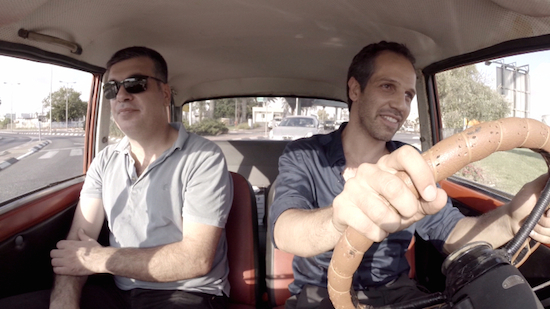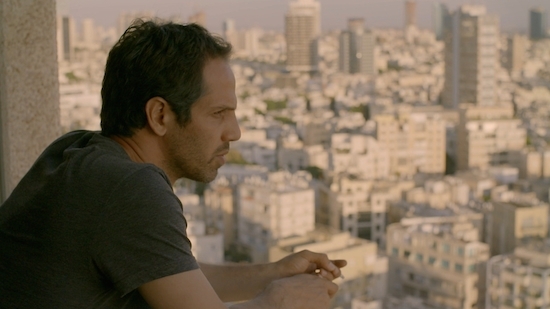Ask me who my favorite contemporary writer is, and the answer may surprise you: Sayed Kashua.
Because while others will mention Coelho, Pamuk, Irving or even Toni Morrison as the writer who most inspires them, I find no one describes the complexities and contradictions of modern existence as author, screenwriter and columnist Sayed Kashua.
Even his introduction is complicated. Kashua is an Israeli Arab, a best-selling Palestinian novelist who writes exclusively in Hebrew and whose books have been published in more than 15 different languages. He is the author of a weekly column, for the Israeli newspaper Haaretz, who for the past twelve years has been calling his editor every Sunday to announce "that's it, I have nothing to say this week, I'm quitting!" Not even five minutes into our conversation -- over the phone because Kashua now lives with his family, and teaches, in Champaign, Illinois -- the author admits, "I miss home very much," home being what he calls "Israel or Palestine." Yet he feels that forcing a return for his wife and children, at this point, would be a "very patriarchal thing to do."
Kashua left Jerusalem in the summer of 2014, right around the time when the bodies of the three Israeli teenagers were found, an event that escalated into the Israel-Gaza conflict called "Operation Protective Edge". It was a time Kashua describes as "sad, even traumatic," when he felt "that there was nothing to do against the policy, the government."
Kashua's departure left a void, one I could definitely feel miles and policies away, hiding in the comfort of the Italian summer, and one that wise greats such as Israeli intellectual Amos Oz addressed poignantly when quoted in a New Yorker article, by saying "the fact that he left saddened me greatly. I can tell you that over the summer there wasn't a decent Israeli who didn't have similar thoughts."
So could there still be hope for a dialogue, what Kashua's writing had persistently and powerfully inspired through his weekly column on Haaretz and in his novels? Perhaps his own answer about this concept of dialogue, this idea that conversation may heal things, made his sudden move an ideal change. "To be honest I don't think that there is a need for dialogues, I think the strong part is the one that makes the rules and I think that the strong part in this case -- in Israel it's the Israeli government -- has to change the discourse." He continues, with a hint of an Israeli accent, in a fluid, kind voice, "I think there is no need for dialogue, there is international law and there is a need to end occupation."
Kashua did have a trick up his sleeve, however, a bit of hope coming our way. It's in the form of a fabulous new television show titled The Writer, created and written by the author, which was selected to be screened at Berlinale 2016 as part of the festival's "Special Series Selection".
The series originally aired on Keshet Broadcasting in Israel to much acclaim earlier this year, and will be launched internationally by Keshet International at MIPTV. Past works produced and distributed by KI include the original version of Homeland, titled Prisoners of War (Hatufim), The A Word, a show centering around a family with an autistic child, which is currently airing as a six-part series on BBC One attracting up to five million viewers, and Kashua's wildly successful dramedy Arab Labor, of which six seasons were made.
With his previous show Arab Labor, Kashua admits, "I proved my ability as a writer and established some kind of platform so that now I can do something different." Kashua elaborates, "I knew at the beginning that in order to bring Arab families to TV you had to use a lot of ironies, a lot of humor, to humanize the characters," then continues, "because one of the major goals was to bring Arab families and Arabic language to mainstream TV." But then, he explains, "I thought now I can do something a little bit different, artistically different and a little more complicated that comedy." That's where The Writer comes in, perfectly.
Now, I may be biased because the struggles and occurrences depicted in the first couple of episodes of the series shoot straight to the core of a writer's constant, internal tussle. But The Writer also deals with family dynamics, with the balance needed to be both an author and a functioning human being, and then pulls it all together to create a phenomenal television experience by dealing with what Kashua describes as "the difficulties he faces and the question of assimilation within this hegemonic culture as a minority." "He" being Kateb, Kashua's fictional alter-ego in The Writer, played brilliantly by Yousef Sweid. Without missing a beat, Kashua then puts his philosophical finger straight on the fact that this is,"something that I think belongs, as refugees and immigration are a major issue now."
It's interesting to hear Kashua's unexpected answer when I question him on whether writing from this first person singular POV ever makes him feel "naked". "Not really, thats the problem," he says, continuing, "I'm naive maybe but I feel that I never expose details from my life." Even with The Writer, which he describes as being "very much personal," in the end, watching the episodes a couple of years after he wrote them, he can separate himself from the events, because he feels that "I grew up and I don't relate to the same story." But his writing is always based in reality because, Kashua explains, "when I write about politics I don't want people to think that it's fiction, I want them to think that it's real -- real life."
The Writer will be looking for new territories this week, at MIPTV, so I question Kashua on what he would want potential US audiences to take away from his show. He's candid with his answer, "it would be great, it would be a new experience for me if the show gets sold to an international channel. It would be so great for me that I don't care what the audience picks up." Then almost giggles through the punchline, "they can choose what they want! Don't drink and drive?"
Towards the end of our conversation, I touch briefly on the political situation in the States, the election frontrunners, and in particular one who seems hellbent on destroying the principles the US has stood for, for so long now... Kashua replies, knee jerk almost, "I was thinking the other day, oh my god, we just moved, give us at least two years of peace before you start your own... I am just a visitor here. I am not a citizen, I can't vote... So I'm worried on a global level, not a personal one."
Would Kashua want to write in English, while in the US? "I'm not sure," he ponders, then continues, "I think that in order to write in English, I need to start focusing on reading English literature and then it might take me something like ten years in order to put a sentence together in English. Meanwhile, I hate even writing emails in English."
Finally, I choose to close with a wildcard question, about the first book the author ever remembers reading. But wildcard questions turn into wilder yet answer, with someone like Kashua. "As a child the first stories were ones I had been listening to, from my grandmother and my aunts, wonderful stories I remember hearing from people, not reading. Again, because there was no library, so those were the most important stories." Then he remembers, "when I was in fourth grade, my mother went and bought us all the kids' stories, Cinderella and Sleeping Beauty, those fairy tales." In fact, Kashua's own version of Cinderella, a short story, is one for the history books!
When I joke that perhaps I should name this piece "Sayed Kashua: Cinderella Man" the author explains, a bit tongue in cheek, that his story deals with, "someone who at midnight turns into a very nationalistic Arab and during the day he's a Jewish lawyer."
And that folks, is how great stories are written. World-changing, humanity-exploring great stories, I mean, like those featured in the first season's episodes of The Writer by Sayed Kashua, of course.
All images courtesy of © Keshet Broadcasting and Dori Media Paran, used with permission.


